Read the Vagus Nerve Impairment Self-Assessment and find out
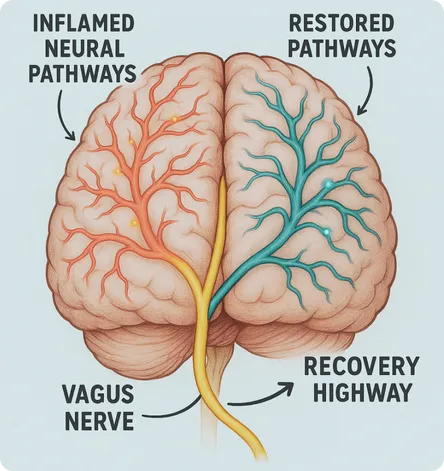
Is Your Nervous System Keeping You in Persistent Post-Viral Fatigue and Brain Fog?
Ask yourself
- Do you experience overwhelming tiredness that doesn't improve with rest, even months after your initial COVID infection?
- Does your brain feel foggy, with difficulty concentrating, remembering things, or finding words?
- Do you feel mentally and physically exhausted after minimal exertion that you could easily handle before COVID?
If you answered yes, your nervous system may be stuck in a dysregulated state following your viral infection, preventing proper recovery and cognitive function.
Physiological Mechanisms:
- Post-viral autonomic dysfunction: COVID-19 can damage the vagus nerve and disrupt autonomic function, leading to persistent tiredness and cognitive impairment that resembles chronic tiredness syndrome.
- Neuroinflammation persistence: Ongoing inflammation in the brain disrupts neurotransmitter balance, affecting dopamine, serotonin, and acetylcholine pathways critical for energy and cognition.
- Mitochondrial dysfunction: Viral infection can impair cellular energy production, leading to profound tiredness and reduced mental clarity that persists long after initial recovery.
Post-viral neurological symptoms may be directly linked to autonomic nervous system dysfunction, with the vagus nerve playing a critical role in post-viral recovery and cognitive restoration.
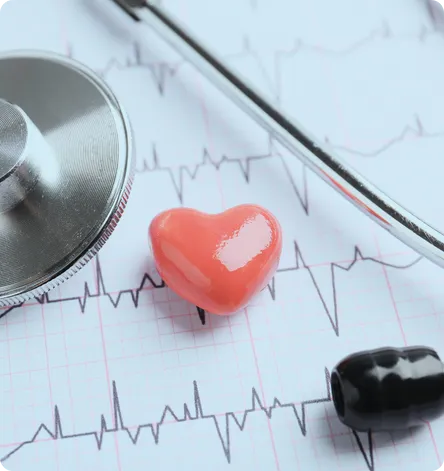
Is Your Nervous System Contributing to Post-Viral Heart Palpitations and Exercise Intolerance?
Ask yourself
- Do you experience rapid heart rate, palpitations, or chest tightness that started after COVID?
- Does minimal physical activity leave you feeling breathless or cause your heart to race excessively?
- Do you struggle with exercise intolerance, unable to reach previous fitness levels without severe symptoms?
Physiological Mechanisms:
- Post-viral Postural Heart Rate Abnormalities: COVID-19 can trigger postural orthostatic rapid heartbeat syndrome, causing abnormal heart rate responses and exercise intolerance through autonomic dysregulation.
- Vagal nerve impairment: Viral damage to the vagus nerve reduces its ability to regulate heart rate variability and maintain cardiovascular stability during activity.
- Dysregulated stress response: Persistent sympathetic nervous system activation leads to heightened cardiovascular reactivity and reduced exercise tolerance.
Post-viral cardiovascular symptoms often reflect autonomic nervous system dysfunction rather than direct heart damage, explaining why standard cardiac tests may appear normal despite persistent symptoms.
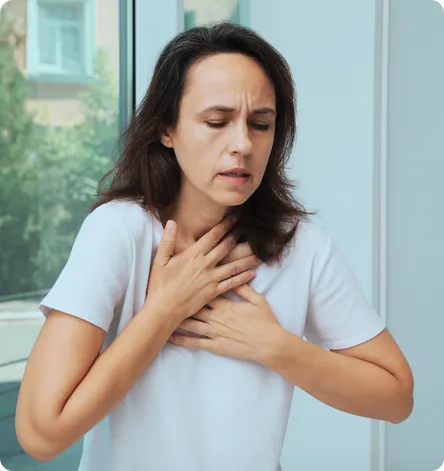
Is Your Nervous System Contributing to Post-Viral Shortness of Breath and Air Hunger?
Ask yourself
- Do you frequently experience shortness of breath or feel like you can't take a deep, satisfying breath?
- Does talking, walking, or mild exertion leave you breathless in ways that didn't happen before COVID?
- Do you experience "air hunger" - a feeling that you're not getting enough oxygen despite normal oxygen levels?
Physiological Mechanisms:
- Vagal respiratory control disruption: COVID-19 can impair vagus nerve regulation of the diaphragm and breathing patterns, leading to dysfunctional breathing even after lung recovery.
- Autonomic breathing dysregulation: Disrupted autonomic control can cause irregular breathing patterns, hyperventilation, or inability to take deep breaths.
- Central nervous system effects: Viral impact on brainstem respiratory centers can persist, causing ongoing breathing difficulties despite clear lungs.
Post-viral breathing difficulties may originate from nervous system dysregulation rather than lung damage, which is why pulmonary function tests often appear normal despite persistent symptoms.
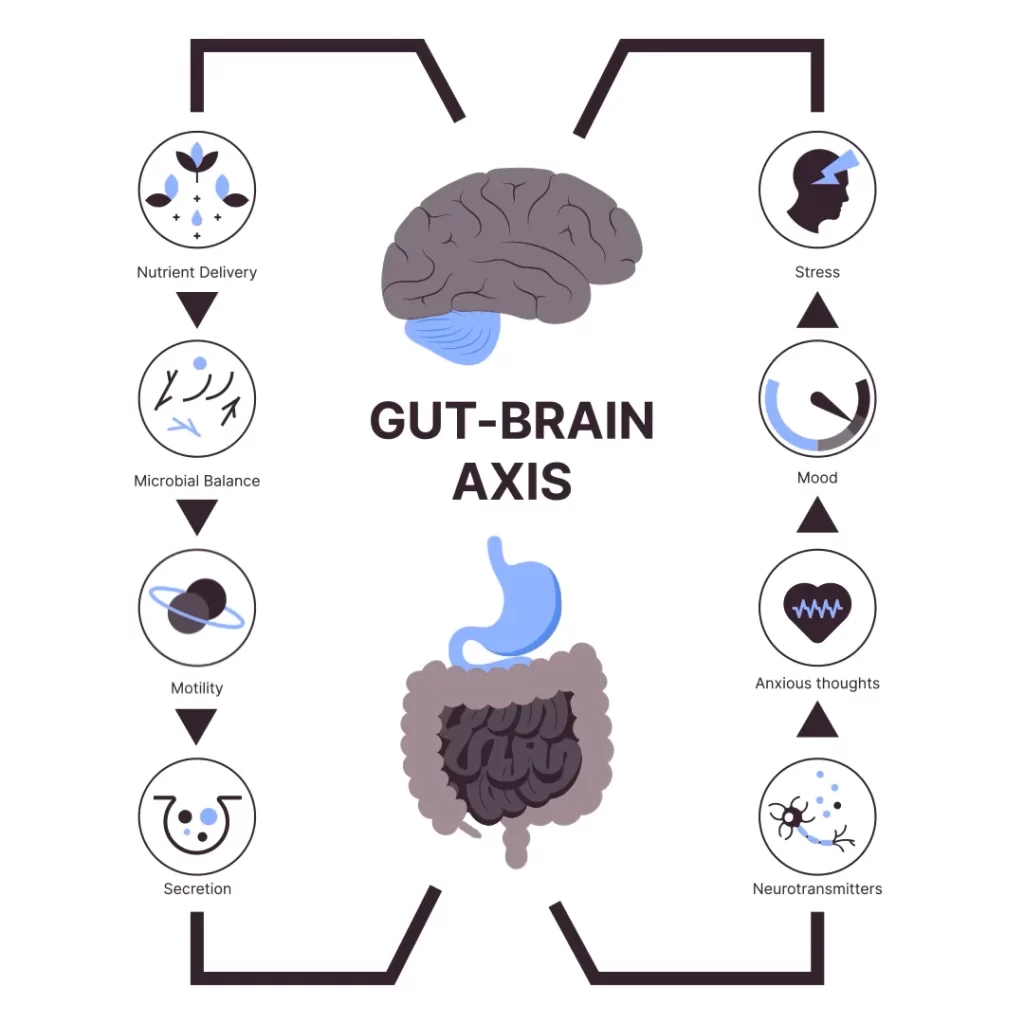
Is Your Nervous System Causing Post-Viral Digestive Issues?
Ask yourself
- Do you experience new or worsened digestive issues like nausea, bloating, or changes in bowel habits since COVID?
- Have you developed food intolerances or sensitivities that weren't present before your infection?
- Do you struggle with loss of appetite, early satiety, or delayed gastric emptying-like symptoms?
Physiological Mechanisms:
- Gut-brain axis disruption: COVID-19 can damage the enteric nervous system and vagal pathways that control digestion, leading to delayed gastric emptying and motility disorders.
- Dysbiosis and inflammation: Viral infection can alter gut microbiome balance and increase intestinal permeability, contributing to ongoing digestive dysfunction.
- Vagal gastroparesis: Impaired vagus nerve function can slow gastric emptying and reduce digestive enzyme production, causing persistent gastrointestinal symptoms.
Post-viral gastrointestinal symptoms often reflect vagus nerve dysfunction and gut-brain axis disruption, requiring approaches that address nervous system regulation rather than just digestive symptoms.

Is Your Nervous System Contributing to Post-Viral Sleep Disruption and Non-Restorative Rest?
Ask yourself
- Do you struggle with frequent night wakings, or difficulty falling asleep since having COVID?
- Do you wake up feeling unrefreshed and exhausted, no matter how many hours you sleep?
- Has your sleep architecture changed, with less deep sleep or vivid, disturbing dreams?
Physiological Mechanisms:
- Circadian rhythm disruption: COVID-19 can affect the hypothalamic-pituitary axis and disrupt natural sleep-wake cycles, leading to persistent sleep problems and non-restorative sleep.
- Autonomic sleep regulation impairment: Damaged vagus nerve function prevents proper transition into parasympathetic dominance needed for deep, restorative sleep.
- Persistent hypervigilance: Ongoing sympathetic nervous system activation keeps the body in an alert state, preventing the relaxation necessary for quality sleep.
Post-viral sleep disorders often stem from autonomic nervous system dysregulation, where the body cannot shift into the parasympathetic state necessary for restorative sleep, regardless of tiredness levels.
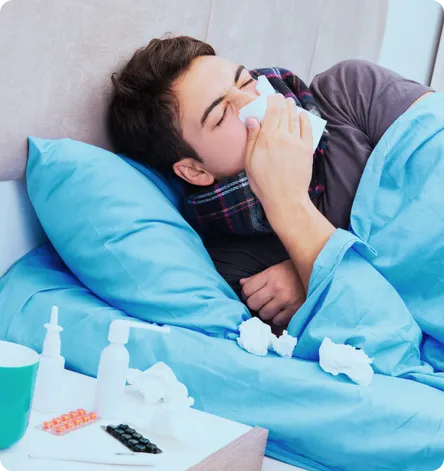
Are Your Post-Viral Symptoms Part of a Post-Viral Autonomic Syndrome?
Ask yourself
- Do you experience multiple unexplained symptoms that seem unrelated but all started after COVID?
- Have you developed new sensitivities to temperature, light, sound, or stress that weren't present before?
- Do your symptoms fluctuate unpredictably, with good and bad days that don't correlate with your activity level?
Physiological Mechanisms:
- Multi-system autonomic dysfunction: COVID-19 can trigger widespread autonomic nervous system dysfunction affecting multiple organ systems simultaneously, creating the complex symptom pattern of persistent post-viral symptoms.
- Autoimmune autonomic neuropathy: Post-viral autoimmune responses can target autonomic nerve fibers, leading to persistent dysfunction across multiple body systems.
- Central sensitization: Viral-induced neuroinflammation can increase nervous system sensitivity, causing symptoms to persist and fluctuate unpredictably long after initial infection.
Post-infectious complications represent a post-viral autonomic syndrome where SARS-CoV-2 triggers lasting dysfunction in the nervous system’s control of vital functions, explaining the diverse and persistent nature of symptoms.
The Missing Piece in Extended SARS-Cov-2 Understanding
Here’s what connects all these post-viral symptoms: your vagus nerve orchestrates every one of these recovery processes.
The vagus nerve serves as your body’s primary recovery pathway, regulating inflammation, coordinating organ function, and facilitating the return to homeostasis after viral insult. When COVID-19 disrupts this system, the cascade of persistent symptoms becomes not just explainable, but addressable.
Research shows vagus nerve stimulation can modulate inflammatory responses and improve autonomic balance, offering new insights into post-viral recovery mechanisms.
Advancing SARS-Cov-2 Research Through Vagus Nerve Modulation

Recent scientific research has begun exploring transcutaneous vagus nerve stimulation as a potential intervention for post-viral autonomic dysfunction. Nurosym represents the most studied approach in this emerging field.
Research Highlights:

Scientific Validation
Over 50 peer-reviewed studies examining vagus nerve stimulation across multiple symptoms, with specific research ongoing for post-viral symptoms.

Institutional Collaboration
Studies conducted in partnership with Harvard, UCLA, NHS, and other leading research institutions.

Safety Profile
Zero serious adverse events reported across scientific studies to date, with regulatory approval as a medical device.
Perspectives from the Medical Community

Anthony Kaveh, MD
Anesthesiologist & Medical Director at Clarus Health
"The question was whether we could help patients achieve sustained relief from an out-of-control sympathetic nervous system. The early results have been encouraging."

Dr Mikolaj Raszek
Researcher at Merogenomics
"Based on the evidence coming out, it looks as if these devices appear to be helping big time in terms of post-viral fatigue."

Dr James Gill
Associate Professor at Warwick Medical School & General Practitioner
"Independent research demonstrated reduced sympathetic nerve activity. The objective improvements in heart rate variability were particularly notable."
Understanding the Science
Current research suggests that vagus nerve stimulation may help address lingering COVID effects through several mechanisms:
- Inflammatory modulation: Activation of the cholinergic anti-inflammatory pathway
- Autonomic rebalancing: Restoration of sympathetic-parasympathetic equilibrium
- Neuroplasticity enhancement: Support for neural recovery and adaptation
- Sleep architecture improvement: Facilitation of restorative sleep cycles
- HRV optimization: Enhancement of heart rate variability markers
These physiological changes align with the core dysfunctions observed in prolonged symptoms, suggesting a mechanistic basis for therapeutic intervention.
Ongoing SARS-Cov-2 Research
The scientific community continues to investigate vagus nerve stimulation for post-viral recovery.
Current Studies:
- Post-viral fatigue and cognitive function
- Autonomic dysfunction in SARS-Cov-2
- Sleep disorders following viral infection
- Exercise intolerance and cardiovascular symptoms
- Gastrointestinal recovery post-COVID
Research Participation: Individuals with post-viral symptoms may be eligible to participate in ongoing research studies while accessing potential therapeutic interventions.
Symptoms Under Investigation
Research is examining vagus nerve stimulation’s potential impact on these post-viral manifestations:
- Post-viral fatigue and energy regulation
- Cognitive dysfunction and brain fog
- Cardiovascular symptoms and exercise intolerance
- Respiratory difficulties and breathing patterns
- Sleep architecture and restorative rest
- Gastrointestinal function and digestion
- Temperature regulation and autonomic control
- Neurological symptoms and sensory processing
- Mood regulation and stress response
- Pain modulation and inflammatory markers
The interconnected nature of these symptoms supports the hypothesis that addressing autonomic dysfunction may provide systemic benefits for post-viral recovery.
A Note on Therapeutic Approaches
While ongoing SARS-Cov-2 research continues to evolve, early evidence suggests that approaches targeting nervous system regulation may offer advantages over symptom-specific therapies.
The autonomic nervous system’s role as a master regulator of physiological function makes it a logical therapeutic target for multi-system post-viral dysfunction.
Current management strategies often address individual symptoms in isolation.
However, understanding SARS-CoV-2 infection as a unified autonomic syndrome suggests that interventions supporting overall nervous system recovery may provide more comprehensive benefits.
Individual results may vary. This information is for educational purposes and should not replace consultation with healthcare professionals familiar with your specific medical situation.
Research Disclaimer: This content discusses ongoing research and should not be considered medical advice. Extended COVID management should involve qualified healthcare providers. Research participation and device use should be discussed with your medical team.
Meet The Doctors
A practicing doctor of psychiatry, Elisabetta has an MBA from INSEAD Business School, and experience in direct patient care, neuroscience research, communication and management. Dr. Burchi is a physician-scientist, working with Parasym in clinical affairs with a track record of publishing in the most important scientific journals such as The Lancet, writing successful grant proposals for the NIH, and leading the production of editorial, clinical, regulatory and promotional material in collaborative multidisciplinary teams. Dr. Burchi has also coordinated clinical trials and implemented a tele-medicine practice which received a certification of excellence among more than 100,000 professionals.

Dr. Elisabetta Burchi, MD, MBA
Translational research lead at Parasym
Experience The Future of Bioelectronic Medicine

Claim €70 OFF the most studied vagal neuromodulation device in the world.
Take part in the study to advance research in neuromodulation and claim €70 subsidy on your device.
*Takes less than 2 minutes to complete.
50+
Ongoing scientific studies
4M+
Happy user sessions
30
Day money back guarantee
![]()
Certified medical device

Claim €70 OFF the most studied vagal neuromodulation device in the world.
Take part in the study to advance research in neuromodulation and claim €70 subsidy on your device.
*Takes less than 2 minutes to complete.
50+
Ongoing scientific studies
4M+
Happy user sessions
30
Day money back guarantee

Certified medical device
30 Day Money-back Guarantee
Every Nurosym Kit is backed by a 30-day, full-refund policy if users aren’t satisfied with their progress.
Got questions? Here is everything you need to know
Symptoms we studied
These symptoms have been linked to autonomic nervous system imbalance and Vagus Nerve Impairment:
- Chronic Tiredness, Fatigue, Brain Fog, Burnout
- Sleep problems
- Negative thought
- Inflammatory symptoms
- Pain, headaches
- Memory & Attention problems
- Post-Viral Symptoms
- Widespread body pain
Our latest research data also suggests Nurosym improves learning and short-term memory and cognition.
Nurosym also has been shown to promote relaxation, mood, sleep, healthy digestion, increased HRV, as well as to alleviate symptoms of stress, burnout, adrenal fatigue.
When can I start feeling the effects?
The timeframe for experiencing the effects of Nurosym varies. Individuals with severe symptoms may notice improvements within 1 to 3 days, while others may see results within 4 to 6 weeks. Rest assured, the transformative benefits of Nurosym will be within reach.
Is Nurosym safe?
Neuromodulation via Nurosym is considered safe when used as intended. Nurosym has been certified by EU regulators as CE certified medical device. This means:
– It is based on scientific evidence
– It is safe to use
– It has demonstrated scientific efficacy
Be sure to read the important safety information before use. Thousands of users have tested the device and no serious adverse effects have been reported in studies to date.
What does it feel like?
Feels like a pleasant, light vibration or tingling sensation in your ear.
Are there any additional costs or subscription fees?
There are no additional costs or fees, only the one-time purchase of the Nurosym.
How long should I use Nurosym each day for optimal results?
We recommend using Nurosym for 1 hour each day, however, benefits can be seen with as little as 15 minutes of use.
Can I perform other activities while using it?
Yes, you can experience the benefits of Neurostimulation anywhere, anytime while doing any activity.
Do I need a prescription to purchase Nurosym?
No. However, we recommend that you consult with your health professional if you’re unsure whether Nurosym is right for you.
What are the details of your 30-day guarantee?
If you try Nurosym daily for 30 days and aren’t happy with your results, we’ll send you a full refund. No questions asked.
Does Nurosym come with a warranty?
Yes! We offer a one-year warranty with every Nurosym device.
How long do orders take to ship?
Orders are processed and dispatched within 1-3 business days.
What is in the Nurosym Package?
- Nurosym device
- Earpiece
- USB charger
- Case
- Quick start guide
The article does not in any way constitute as medical advice. Please seek consultation with a licensed medical professional before starting any treatment. This website may receive commissions from the links or products mentioned in this article.
Share via:

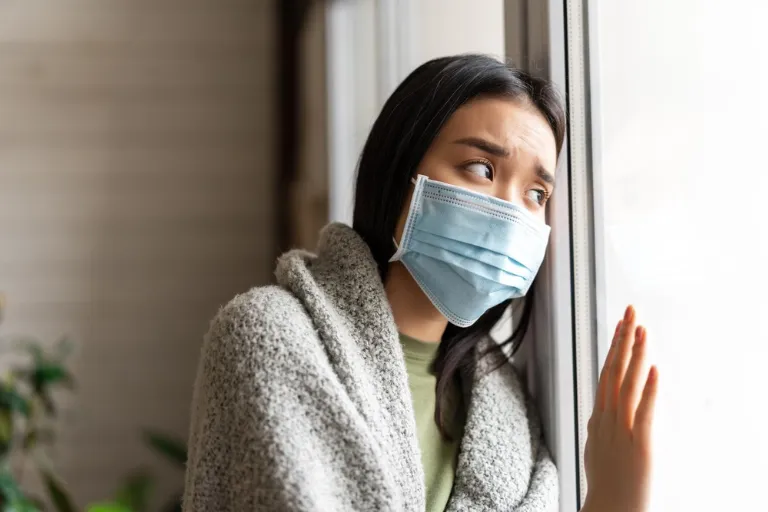

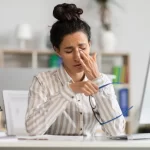
I’ve had brain fog and exhaustion since COVID and nothing really explains it — this feels uncomfortably accurate.
I’ve done every blood test under the sun and they all come back ‘normal’. Interesting to see the nervous system angle